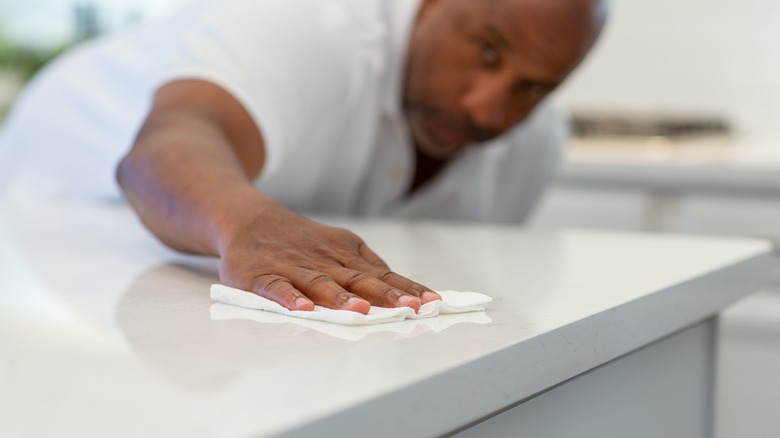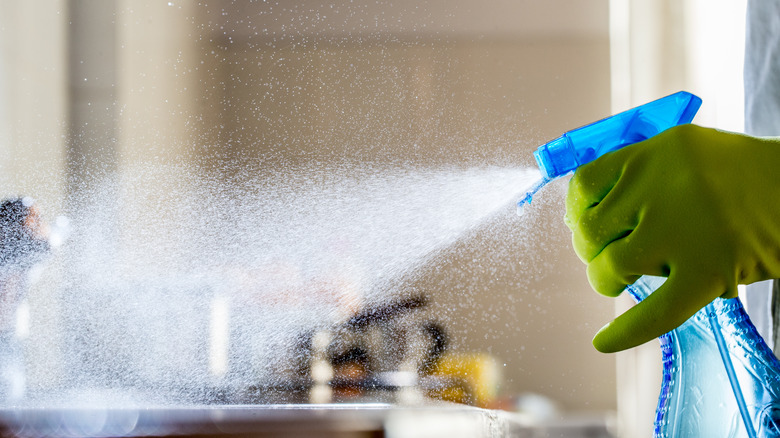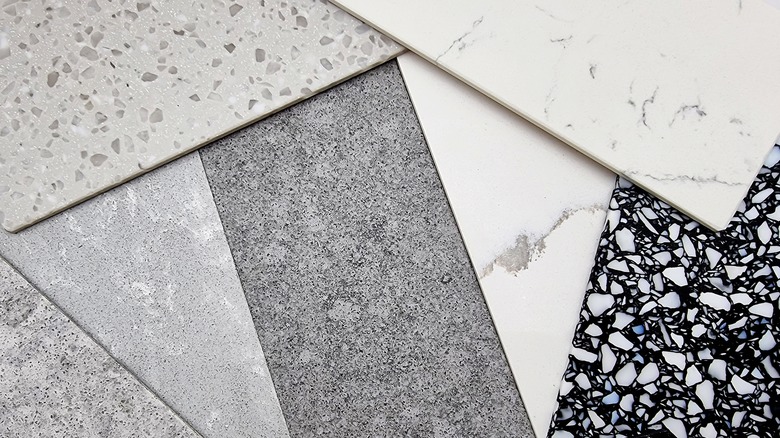Should You Clean Quartz Countertops With Hydrogen Peroxide?
Quartz is one of several natural stones commonly used in interior design, offering a sophisticated and subtle sparkle to kitchens and bathrooms alike. It's one of the most in-demand countertop materials on the market, as well as one of the most expensive. The stone is also extremely durable and will maintain its luster so long as you care for it properly. This luxurious material deserves the best treatment, which includes frequent cleanings using products that are both safe and effective. The common household wound cleanser, hydrogen peroxide, is safe on quartz countertops but should be used in the appropriate ratio to achieve the best results.
Despite its status as a household staple, hydrogen peroxide can become dangerous around the home if used too much or too often. Moreover, the solution can cause irreparable damage to your quartz counters if treated as a daily cleanser. In other words, the compound should not fully substitute tamer methods of cleaning, like warm, soapy water and a microfiber cloth, which should be used regularly to wipe up minor messes. Baking soda and rubbing alcohol are also generally safe, but you can also opt for a cleaner designed specifically for quartz countertops. Here's everything you need to know about cleaning quartz with hydrogen peroxide, as well as other steps you can take to keep your quartz counters looking brand new for years following installation.
How to clean quartz with hydrogen peroxide
Hydrogen peroxide is perfect for removing the toughest of stains from your quartz counters, but the chemical also acts as a disinfectant, eliminating up to 99% of germs. Hydrogen peroxide is often used to clean exterior scrapes and cuts before applying medicine, but quartz is more tolerant of the chemical than human skin, so be sure to wear protective gloves to keep the product from damaging your hands. Avoid using stronger concentrations of the compound than those typically used around the home. Any concentrations higher than 3% may risk permanently damaging the quartz.
Dilute the hydrogen peroxide by mixing it with water or baking soda beforehand. When combining hydrogen peroxide and water, add equal amounts of both substances to a spray bottle and spritz the mixture over the counter before wiping it up with an appropriate cloth or sponge. When combined with baking soda, stir both ingredients into a paste and spread it onto the stain before covering it with plastic wrap. This wrapping, called a poultice, should remain intact for several hours, allowing the mixture to break down the stain underneath without outside interference. Once it's time to remove the poultice, use a damp cloth to wipe up the remnants of the mixture and stain. Only opt to use a poultice to remove tougher stains from the counter.
Other care instructions for quartz countertops
While weekly scrubs using hydrogen peroxide are efficient at knocking out hard stains that develop on your counters, there are other measures homeowners can take to keep quartz countertops in pristine condition. A basic wipe-down using a dry, soft cloth each day can pick up minor loose spills that may occur while cooking or eating. For everyday stains that require a bit more effort to remove, dampen the cloth with warm water and add a bit of dish soap to make cleanup easier.
To avoid scratching the surface of your counters, refrain from using abrasive materials when cleaning, like rough sponges, brushes, or cloths. Harsher chemicals like bleach are also harmful to natural stone countertops, as are cleaning solutions made with vinegar. Although quartz counters are usually heat-resistant, this doesn't make them immune to burn marks caused by hot pans, so be sure to place pads or heat-resistant mats on the stone before setting down any hot objects. Also, remember to use coasters and cutting boards — condensation from cups and glasses can form hard-to-remove water rings, and chopping on the bare counter can create tiny, permanent scratches in the stone.


